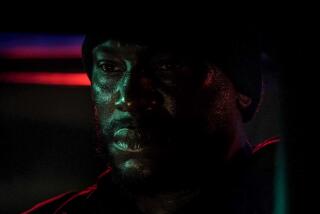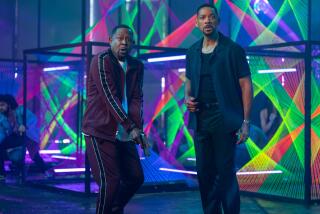TV’s ‘Riot’ Sparks Debate on Portrayal of Violence
- Share via
The makers of “Riot” had no illusions. They knew they were taking on a controversial subject in tackling a dramatic presentation of Los Angeles’ 1992 civil unrest, and that the film might reopen bitter wounds.
Still, producers Harry Winer and Judith Polone have hopes that the film, which premieres on the Showtime pay cable channel April 27 to commemorate the fifth anniversary of the riots, would provoke spirited but positive dialogue, and help heal the still-smoldering tensions surrounding the unrest. They believe that the four interlocking stories of Latinos, African Americans, Korean Americans and a white LAPD officer will help illustrate how different cultures suffered during the riots.
But Winer and Polone, as well as Los Angeles City Council members and other community leaders who attended a special screening of “Riot” Friday evening at the First African Methodist Episcopal Church in Los Angeles, were caught off guard, unprepared for the eruption of anger and emotion unleashed after the screening.
Several members of the large, racially diverse audience criticized the film, saying it was filled with negative images and was not an accurate reflection of their communities or their stories. Some said the violence in the film, which shows Latinos and Koreans being attacked by blacks, might aggravate racial tensions.
“Instead of ‘Riot,’ this movie should be called ‘Stereotype,’ said one viewer named Fidel, who identified himself as a Native American teacher. “There is no context of why what happened took place. All this shows is people of color beating up on each other.”
Said another audience member: “We don’t need another film like this. We need more positive movies.”
“Riot” stars Mario and Melvin Van Peebles, Luke Perry, Cicely Tyson and Mako, and is relentless in its depiction of looting, violence and terror during the riots. The action is heightened by an intense, booming soundtrack and dialogue loaded with an almost-endless stream of coarse language.
Two of the four fictional stories were written and directed by Galen Yuen, a Chinese American, and David C. Johnson, an African American. Alex Munoz directed a Latino-themed segment written by the late Joe Vasquez. Richard DiLello wrote and directed a segment about a troubled white police officer who fires into an angry mob when he is surrounded.
Although the audience applauded after the movie, the post-film meeting, with panelists including council members Ruth Galanter and Mike Hernandez and Assistant LAPD Police Chief Bayan Lewis, deteriorated after KABC-AM (790) radio talk show host Michael Jackson used an expletive to silence an audience member. Jackson interrupted other speakers from the crowd in what some said was a condescending tone.
Bo Taylor of Unity One, a gang intervention organization, and several members of the group stood up in the back of the room and lashed out at Jackson for showing disrespect and “cursing in the house of God” and demanded he apologize, which Jackson did.
*
The atmosphere became more heated when Taylor, saying he was upset that the filmmakers had not consulted with his group about showing the positive work the organization did after the riots, moved to the front of the room and confronted Jackson and the panel. He accused them of coming “down here with your agendas,” and questioned whether any revenue from the film would be given back to the community.
Other audience members were upset that there were no African American leaders on the panel. Council member Rita Walters, who was set to be on the panel, left before the film was shown. The Rev. Cecil “Chip” Murray, senior minister of First AME, also slated for the panel, chose to be with the audience.
Writer/director Johnson managed to ease the tension a bit.
“When we were making this movie, I knew this was going to happen,” he said, referring to the emotional responses. Then he addressed Taylor, and said: “I didn’t tell your story because I was not going to get it right.” He also said he had problems with other segments of the Korean-themed portion of the film showing blacks looting and attacking innocent victims, but that he had to give respect to Yuen.
“What this film is saying is, ‘Walk a few miles in someone else’s shoes,’ ” said Johnson, who later shook hands with Taylor.
Others praised the film. Koreatown/West Adams Assn. secretary general Yohngsohk Choe, said, “This film is not trying to stereotype anyone. It’s trying to describe the very painful experiences.”
Former City Council member Michael Woo said, “There are things in this movie that people will not want to hear. But the reality that didn’t change after 1992 is the real problem, not this movie.”
More to Read
Only good movies
Get the Indie Focus newsletter, Mark Olsen's weekly guide to the world of cinema.
You may occasionally receive promotional content from the Los Angeles Times.











